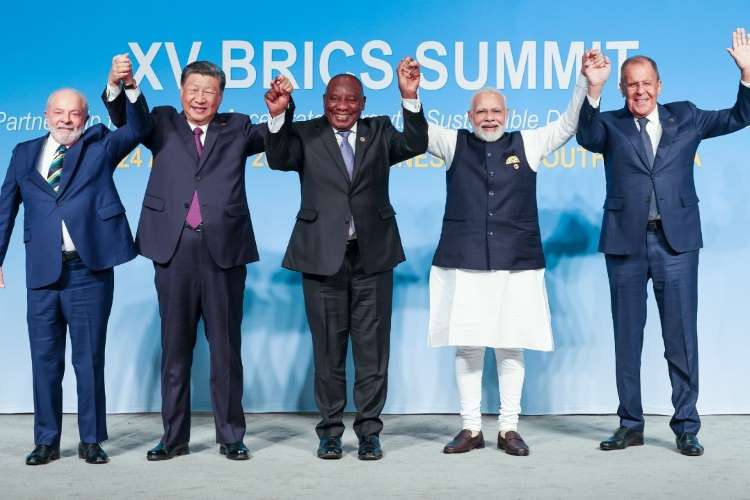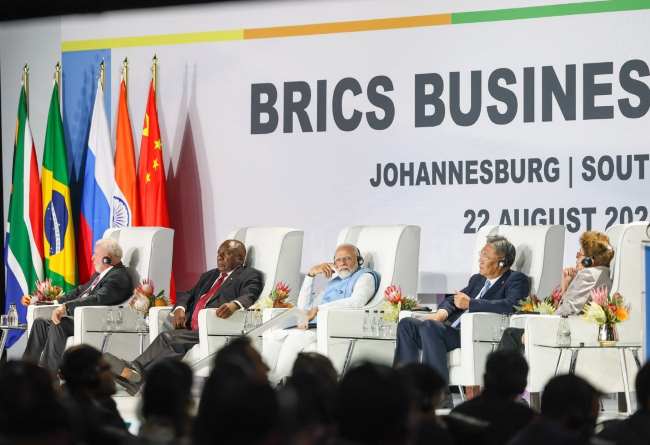
South Africa joined the four emerging economies — Brazil, Russia, India, and China — in 2010 to create BRICS, a coalition that seeks to address the inequities of the global order and institutional governance. The idea of the grouping was mooted by Goldman Sachs economist Jim O’Neil in a paper titled “Building a Better Global Economic BRIC” in 2001. In 2003, Goldman Sachs predicted that these emerging economies’ combined strength would significantly alter the global economy, surpassing the Western-dominated order before 2039. According to Bloomberg’s economic estimates, an expanded BRICS group would represent approximately half of the global output by 2040.
In fact, BRICS is more globally represented than the UN Security Council and the G7, but less so than the G20, which is Western-dominated. This highlights the importance of BRICS in the world economy. The governments of BRICS countries have been meeting annually to address regional and multilateral issues through formal summits and to devise measures to confront challenges in the global economy and governance.
READ I Climate finance: Investing in the trillion-dollar global opportunity
Signals from BRICS summit 2023
The 15th BRICS summit, held in Johannesburg, marked the first in-person gathering since 2019 and garnered significant global interest. Leaders unanimously expressed their commitment to fostering a multipolar world order based on international law and compliance, which would contribute to a more humane global society. They also advocated for the rapid expansion of BRICS to enhance global governance equity. Proposed measures include deepening economic cooperation among member countries through trade agreements, particularly by using national currencies.

The geopolitical influence of BRICS can be measured by its share of global GDP, which has increased from 8% in 2001 to 26%. In contrast, the G7’s share of global GDP has decreased from 65% to 43.7% during the same period, with their share of the global population at around 10%.
Another estimate indicates that the BRICS group currently represents 41% of the global population, 31.5% of global GDP based on purchasing power parity, and 16% of global trade. The relevance of this organisation has grown, especially in light of geopolitical conflicts such as the Russia-Ukraine war, resulting in sanctions imposed by the US and Western allies against Russia, including the suspension of SWIFT messaging for financial transactions and ongoing US-China trade tensions.
READ I BRICS currency faces challenges, but potential benefits are huge
The 15th BRICS summit, held this week, underscored the organisation’s relevance and potential, as evidenced by a surge in aspiring countries seeking membership. Out of 22 countries formally applying for membership, six new members were inducted: Egypt, Iran, Saudi Arabia, UAE from the West Asian region, Ethiopia from Africa, and Argentina from South America.
With the inclusion of the six new members, the global share of BRICS+6 countries would further rise to 46.3% of global population, 36.9% of GDP in PPP terms, 24.1% of exports, and 39.4% of global trade in crude oil. Throughout its development, BRICS prioritised ideas over ideologies and remained open and transparent. During the Russia-Ukraine conflict and consequent sanctions, BRICS partners consistently supported Russia’s economic and diplomatic survival.

The BRICS New Development Bank has played a significant role in developing member countries, funding nearly 100 projects for infrastructure and sustainable development, while also instituting a Contingent Reserve Arrangement and other institutional mechanisms. The NDB’s plans to lend in BRICS members’ currencies aim to reduce reliance on the US dollar. BRICS countries have demonstrated their ability to collaborate on practical initiatives to a great extent.
One significant development is the strategic decision by the BRICS economic block to abandon the use of the US dollar for trade settlement, opting to use local currencies. This decision has far-reaching implications, shifting power dynamics and asserting independence in a world dominated by traditional giants. The 15th Summit emphasised the promotion of local currencies and the political expansion of the block. With countries like Saudi Arabia, Iran, and UAE conducting oil trades in local currencies, the potential for oil sales in US dollars will diminish.
However, the lack of coherence and mutual trust among BRICS members remains a challenge, particularly for India and like-minded countries. Distrust between China and India, as well as between the newly inducted Iran, Saudi Arabia, and UAE, could potentially create issues within the BRICS group in the future. The main challenge will be to strike a balance between a China-centric, West-centric, or a balanced global order.
China aims to establish new plurilateral institutions that minimise the influence of Western powers. While India must moderate China’s influence in non-Western forums, it should also avoid isolating other countries in the global South that may see merit in China’s efforts to expand forum memberships. China’s attempts to overpower the group with its strategic influence require firm resistance.
Similarly, the idea of a common BRICS currency appears remote due to the lack of strong local currencies and divergent economic conditions and performances among member countries. According to Jim O’Neil, while the expansion of BRICS based on specific criteria is a welcome move, the idea of a common BRICS currency is premature and perhaps “ridiculous,” especially given the sustained confrontation between two major players, China and India.
In any case, India’s best course of action is to remain within the group, constantly working together to build a democratic model of global governance in a multipolar world that attracts countries from the global South. With optimal cooperation, BRICS has the potential to lead to a new international economic order.
(The author is an economist based in Kochi. He was the head of the Department of Economics, Central University of Kerala, Kasaragod.)
Dr Ravindran AM is an economist based in Kochi. He has more than three decades of academic and research experience with institutions such as CUSAT, Central University of Kerala, Cabinet Secretariat - New Delhi, and Directorate of Higher Education Pondicherry.

